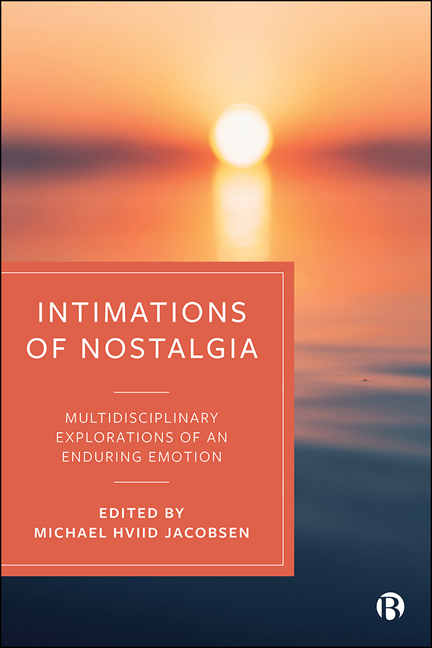Book contents
- Frontmatter
- Contents
- Notes on Contributors
- Preface and Acknowledgements
- Introduction: The Many Different Faces of Nostalgia – Exploring a Multifaceted and Multidisciplinary Emotion
- 1 Philosophy and Nostalgia: ‘Rooting’ within the Nostalgic Condition
- 2 History and Nostalgia: Historicizing a Multifaceted Emotion
- 3 Political Theory and Nostalgia: The Power of the Past in the History of Political Thought
- 4 Sociology and Nostalgia: Micro-, Meso-and Macro-level Dimensions of an Ambiguous Emotion
- 5 Psychology and Nostalgia: Towards a Functional Approach
- 6 Anthropology and Nostalgia: Between Hegemonic and Emancipatory Projections of the Past
- 7 Media Studies and Nostalgia: Media Philosophy and Nostalgizing in Times of Crisis
- 8 Marketing and Nostalgia: Unpacking the Past and Future of Marketing and Consumer Research on Nostalgia
- 9 Literature and Nostalgia: Vestiges of Paradise
- 10 Architecture and Nostalgia: The End of History, the End of the Future and the Prospect of Nostalgia
- Postscript: On Nostalgia of the Future and the Future of Nostalgia – Some Scattered Concluding Observations
- Index
1 - Philosophy and Nostalgia: ‘Rooting’ within the Nostalgic Condition
Published online by Cambridge University Press: 13 May 2022
- Frontmatter
- Contents
- Notes on Contributors
- Preface and Acknowledgements
- Introduction: The Many Different Faces of Nostalgia – Exploring a Multifaceted and Multidisciplinary Emotion
- 1 Philosophy and Nostalgia: ‘Rooting’ within the Nostalgic Condition
- 2 History and Nostalgia: Historicizing a Multifaceted Emotion
- 3 Political Theory and Nostalgia: The Power of the Past in the History of Political Thought
- 4 Sociology and Nostalgia: Micro-, Meso-and Macro-level Dimensions of an Ambiguous Emotion
- 5 Psychology and Nostalgia: Towards a Functional Approach
- 6 Anthropology and Nostalgia: Between Hegemonic and Emancipatory Projections of the Past
- 7 Media Studies and Nostalgia: Media Philosophy and Nostalgizing in Times of Crisis
- 8 Marketing and Nostalgia: Unpacking the Past and Future of Marketing and Consumer Research on Nostalgia
- 9 Literature and Nostalgia: Vestiges of Paradise
- 10 Architecture and Nostalgia: The End of History, the End of the Future and the Prospect of Nostalgia
- Postscript: On Nostalgia of the Future and the Future of Nostalgia – Some Scattered Concluding Observations
- Index
Summary
Introduction
This chapter, without claiming to be exhaustive, aims to deepen the investigation around the theme of nostalgia from a purely philosophical point of view. The purpose is not to examine ‘philosophers’ or ‘philosophical theories on nostalgia’ – as they are difficult to identify – but, rather, to locate nostalgia within the philosophical heritage, trying to make famous thinkers of the classical tradition interact with other, more contemporary ones.
By adopting this approach, it is possible to verify how the object of analysis (nostalgia) can, in some respects, be considered a supra-historical constant: despite the ambiguity that characterizes it, the theme of nostalgia, in fact, emerges with a certain clarity and redundancy in close correlation with philosophical investigations related to the processes of memory (mnestic functions) and to researches on the knowability (or definition) of time in three dimensions (past, present, future). Through this examination, attention is drawn to two other types of interaction between nostalgia and philosophical knowledge, which link to those mentioned earlier: one concerns the relationship between the nostalgic condition and knowledge (of ourselves and of reality), where a reading of nostalgia as an instrument of knowledge is proposed; the other makes some reflections, starting from the question of how nostalgia can determine the construction of personal identity.
In the first section, ‘Nostalgia as maieutics’, the nostalgic condition investigates philosophical exercise, making specific reference to the Socratic metaphor. Socrates compared the philosophical exercise (in particular, the one carried out in a dialogical form) to the maieutic art, the art of the midwife/obstetrician, asserting that the effort to be made by every human being in the philosophical search for truth should be solicited to the point of making the interlocutor ‘give birth’ to the expected truth. A similar procedure occurs for any object of knowledge investigated, even the human being in all his complexity. For this reason, the labour of knowing, together with the effort that it implies, responds to the Socratic call to ‘take care of yourself’ (epimèleia heautou). The latter, from late antiquity to the contemporary age, has been accepted as an appeal to make the philosophical exercise a cure for the soul and a behavioural doctrine with social, moral and political implications, even if it later lost the spiritual charge that was strongly present in the classical era.
- Type
- Chapter
- Information
- Intimations of NostalgiaMultidisciplinary Explorations of an Enduring Emotion, pp. 31 - 51Publisher: Bristol University PressPrint publication year: 2021

